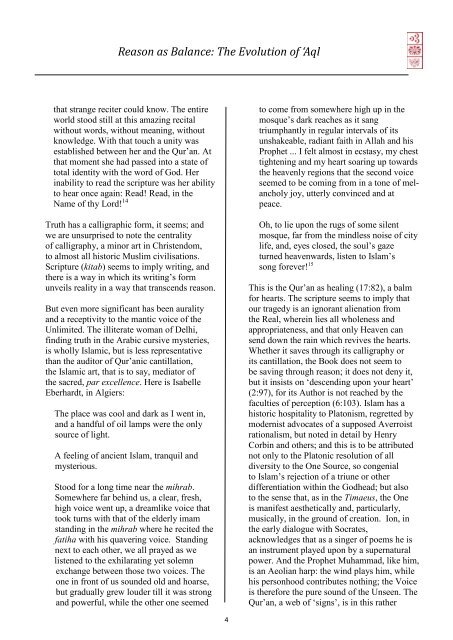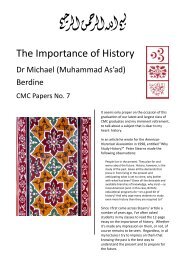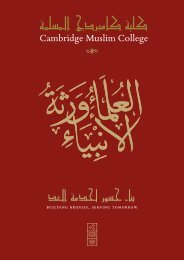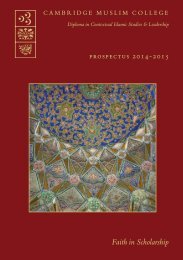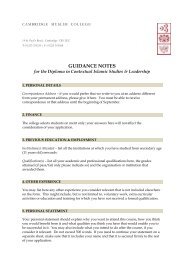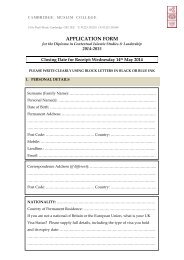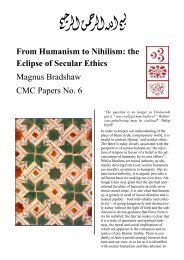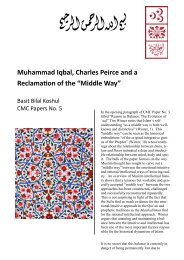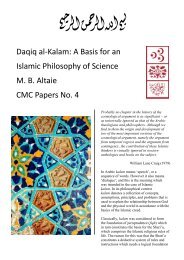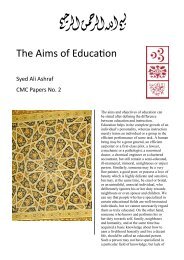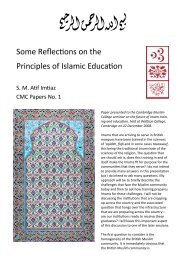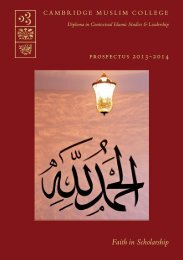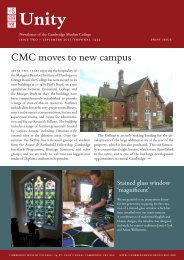You also want an ePaper? Increase the reach of your titles
YUMPU automatically turns print PDFs into web optimized ePapers that Google loves.
Reason as Balance: The Evolution of ‘Aql<br />
that strange reciter could know. The entire<br />
world stood still at this amazing recital<br />
without words, without meaning, without<br />
knowledge. With that touch a unity was<br />
established between her and the Qur’an. At<br />
that moment she had passed into a state of<br />
total identity with the word of God. Her<br />
inability to read the scripture was her ability<br />
to hear once again: Read! Read, in the<br />
Name of thy Lord! 14<br />
Truth has a calligraphic form, it seems; and<br />
we are unsurprised to note the centrality<br />
of calligraphy, a minor art in Christendom,<br />
to almost all historic Muslim civilisations.<br />
Scripture (kitab) seems to imply writing, and<br />
there is a way in which its writing’s form<br />
unveils reality in a way that transcends reason.<br />
But even more significant has been aurality<br />
and a receptivity to the mantic voice of the<br />
Unlimited. The illiterate woman of Delhi,<br />
finding truth in the Arabic cursive mysteries,<br />
is wholly Islamic, but is less representative<br />
than the auditor of Qur’anic cantillation,<br />
the Islamic art, that is to say, mediator of<br />
the sacred, par excellence. Here is Isabelle<br />
Eberhardt, in Algiers:<br />
The place was cool and dark as I went in,<br />
and a handful of oil lamps were the only<br />
source of light.<br />
A feeling of ancient Islam, tranquil and<br />
mysterious.<br />
Stood for a long time near the mihrab.<br />
Somewhere far behind us, a clear, fresh,<br />
high voice went up, a dreamlike voice that<br />
took turns with that of the elderly imam<br />
standing in the mihrab where he recited the<br />
fatiha with his quavering voice. Standing<br />
next to each other, we all prayed as we<br />
listened to the exhilarating yet solemn<br />
exchange between those two voices. The<br />
one in front of us sounded old and hoarse,<br />
but gradually grew louder till it was strong<br />
and powerful, while the other one seemed<br />
4<br />
to come from somewhere high up in the<br />
mosque’s dark reaches as it sang<br />
triumphantly in regular intervals of its<br />
unshakeable, radiant faith in Allah and his<br />
Prophet ... I felt almost in ecstasy, my chest<br />
tightening and my heart soaring up towards<br />
the heavenly regions that the second voice<br />
seemed to be coming from in a tone of melancholy<br />
joy, utterly convinced and at<br />
peace.<br />
Oh, to lie upon the rugs of some silent<br />
mosque, far from the mindless noise of city<br />
life, and, eyes closed, the soul’s gaze<br />
turned heavenwards, listen to Islam’s<br />
song forever! 15<br />
This is the Qur’an as healing (17:82), a balm<br />
for hearts. The scripture seems to imply that<br />
our tragedy is an ignorant alienation from<br />
the Real, wherein lies all wholeness and<br />
appropriateness, and that only Heaven can<br />
send down the rain which revives the hearts.<br />
Whether it saves through its calligraphy or<br />
its cantillation, the Book does not seem to<br />
be saving through reason; it does not deny it,<br />
but it insists on ‘descending upon your heart’<br />
(2:97), for its Author is not reached by the<br />
faculties of perception (6:103). Islam has a<br />
historic hospitality to Platonism, regretted by<br />
modernist advocates of a supposed Averroist<br />
rationalism, but noted in detail by Henry<br />
Corbin and others; and this is to be attributed<br />
not only to the Platonic resolution of all<br />
diversity to the One Source, so congenial<br />
to Islam’s rejection of a triune or other<br />
differentiation within the Godhead; but also<br />
to the sense that, as in the Timaeus, the One<br />
is manifest aesthetically and, particularly,<br />
musically, in the ground of creation. Ion, in<br />
the early dialogue with Socrates,<br />
acknowledges that as a singer of poems he is<br />
an instrument played upon by a supernatural<br />
power. And the Prophet Muhammad, like him,<br />
is an Aeolian harp: the wind plays him, while<br />
his personhood contributes nothing; the Voice<br />
is therefore the pure sound of the Unseen. The<br />
Qur’an, a web of ‘signs’, is in this rather


